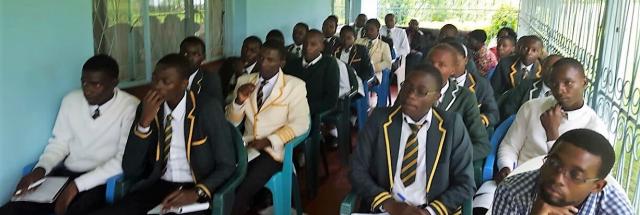IofC/MRA Zimbabwe gets into schools
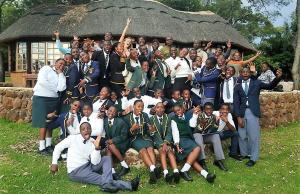 Zimbabwe is a youthful country, with approximately 60% of its 13 million population under the age of 30, and this is estimated to increase over the coming years.
Zimbabwe is a youthful country, with approximately 60% of its 13 million population under the age of 30, and this is estimated to increase over the coming years.
With Zimbabwe’s economy at a worrying level, the youth take the brunt and face several socio-economic challenges. These challenges include: high unemployment (83% of youth are unemployed), poor educational opportunities, limited civic engagement opportunities, low access to skill development, teenage pregnancy, and early marriage.
There are scare opportunities for young people after secondary and even tertiary education. Angry with lack of opportunities at home, 40% of the Zimbabwean diaspora around the world are youth. There is a great need to nurture and help develop the potential that is in these millions of young people which IofC/MRA (Initiatives of Change/Moral Re-Armament) Zimbabwe has taken on.
On 27 January, five IofC/MRA Zimbabwe members delivered a day-long training for 25 prefects and five teachers from Tongogara, a government-run high school in the rural areas of Shurugwi.
Mrs Katito, who has been part of MRA since the 1980's, started by introducing IofC/MRA as a way of life and telling stories of how the movement has guided her, including how the four moral standards (love, purity, honesty and unselfishness) have changed her life. “After being introduced to the standards, I realized there were things in my life I had to change, for example taking items from my work that I should not have. I took these back and apologised for my behaviour,” she shared. Mrs Katito talked about how import ‘quiet time’ has been to her and encouraged the youth to make space to sit in quiet each day to listen to the voice of God and see where you are being led.
IofC/MRA Youth Program Manager Victor T. Nyanhete presented 'Are Prefects Masters or Servants'. Victor gave a motivating talk on the role prefects have in leading others, especially the responsibility in leading those younger than them in a positive way.
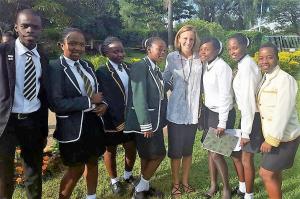 Visitor, Talia Smith from IofC UK, who is supporting the IofC/MRA team for one month presented ‘Communication Skills for a Leader’. She introduced the theme, the different types of communications and gave examples of each. “Communication is one of the most important skills you can develop as not just a leader but as an individual,” she said.
Visitor, Talia Smith from IofC UK, who is supporting the IofC/MRA team for one month presented ‘Communication Skills for a Leader’. She introduced the theme, the different types of communications and gave examples of each. “Communication is one of the most important skills you can develop as not just a leader but as an individual,” she said.
Mr Katito, Chairman of IofC/MRA Zimbabwe, presented the theme of Opposition, Criticism and Competition. “Opposition should be taken gracefully. You should look at the reason why you are facing it - your behaviour, your attitude,” he said. He encouraged the youth to “take stock of their actions and attitudes” and use the standards as their guide. “You might need to apologize if you have done something wrong. It will make a significant difference to your relationship and the atmosphere around you,” he concluded.
One young man shared about criticism he faced from peers about how he is too strong with younger children in the school. He said he hadn't realised his behaviour.
Benjamin Franklin once said ‘time is the stuff of which life is made' and time management is a vital skill for youth to develop. Victor led a session on ‘Managing Self, Managing Time.’ “Part of managing yourself is prioritizing activities for the day. I am the master of my own fate and therefore I have to manage my time,” he expressed. Victor guided the group of late teens and highlighting steps in order to grow oneself: attention to grow (do I want to develop), the will to grow, discipline to grow and having a sense of humour (‘smile and let things go’). “Ask yourself - are you ready to grow and to leave your comfort zone? Do you believe ordinary people can do extraordinary things?” Victor rhetorically questioned.
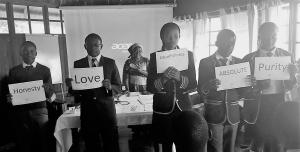 Two days later, IofC members delivered the same leadership training for 34 students and nine teachers from Nkululeko High School. Different members of the IofC youth team joined so they could gain experience in facilitation. The group differs each time, giving each team member the opportunity to deliver the training. IofC/MRA Zimbabwe have been delivering leadership training in schools since 1985. Three training programs took place last year.
Two days later, IofC members delivered the same leadership training for 34 students and nine teachers from Nkululeko High School. Different members of the IofC youth team joined so they could gain experience in facilitation. The group differs each time, giving each team member the opportunity to deliver the training. IofC/MRA Zimbabwe have been delivering leadership training in schools since 1985. Three training programs took place last year.
The four standards were highlighted throughout the day, presenters regularly asking participants to shout them out. They left with the moral principles imprinted in their minds. Personal stories were shared to demonstrate the topics from both the team and the youth.
During the session on peer pressure, an IofC youth team member, who was facilitating, shared how he used to make many bad decisions due to peer pressure. It was after joining IofC/MRA and reflecting on his life that he realized he did things because of his friends. Now, the four standards guide him to make the right decisions.
Other sessions in the day included ‘Trust and Integrity in leadership’, presented by Talia Smith, Conflict Resolution and Team-Building Skills.
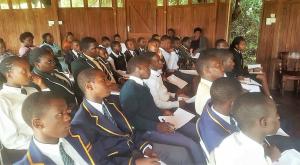 At the end of the day, the Head teacher had an ‘inspired idea’ and set the students a challenge to sign-up to represent all the students in different departments in the school such as sports, the tuck-shop, etc. “We have all learned a lot today, including myself. I would like you to continue your training in leadership and this is one way you can do that. Give your names to the head boy and girl and we will implement the plan next week,” he said
At the end of the day, the Head teacher had an ‘inspired idea’ and set the students a challenge to sign-up to represent all the students in different departments in the school such as sports, the tuck-shop, etc. “We have all learned a lot today, including myself. I would like you to continue your training in leadership and this is one way you can do that. Give your names to the head boy and girl and we will implement the plan next week,” he said
Participants stood up and said how they were inspired by the day – “I will be more courageous, I will work on being trustworthy, I will tell my friends what I have learned,” shared one.
Testimonials from the evaluation showed the effort from the team was well worth it; “I want to thank IofC/MRA because I believe I am a changed person;” “thank you for imparting a life changing experience. I promise I will apply your teachings to myself first and the world at large;” “it was a moment to be always remembered because I learned things in a unique way” and “today I had my turning point from being a bad leader to a good leader. The IofC club is the best in Zimbabwe!”
IofC/MRA conducted three leadership trainings in 2016. The team hope to expand the program to further provinces and to train more youth team members to be facilitators, giving each a turn to experience delivering a prefect workshop.
Written by Talia Smith

